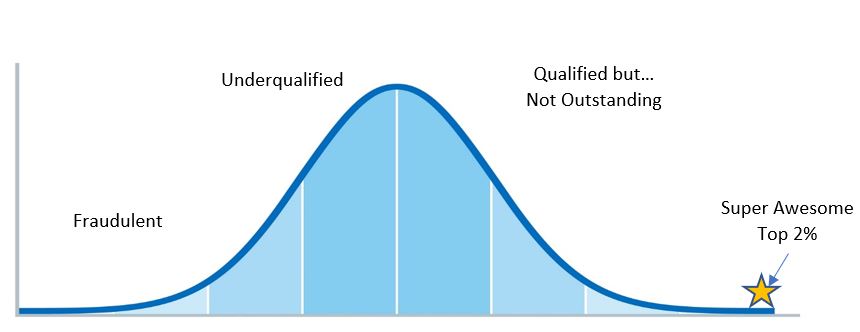In today’s market, it isn’t uncommon to have hundreds of job applicants apply for a single job. But who do you want to speak with?
It is our estimate that at least 25% of your job applicants will be fraudulent, another 25%(ish) will be underqualified, 48% will be qualified but…well…ermmm, and 2% will be awesome!
Ang’s Job Applicant Bell-Shaped Curve
If you are like us, you are looking for the 2%…but how do you quickly get through the hundreds of applicants in order to identify the top 2%? After all, those super awesome CRAs won’t be on the market for long.
Whatever you do, don’t interview the Job Applicants…Yet
Before you spend any time on the phone talking to these folks, spend some time pre-qualifying them in order to shortlist the top candidates. Here’s how:
| Step | Tips and Insights |
| View the communication venue they used to apply, reviewing the grammar, spelling, and punctuation.
Do this before you look at the resume! | While you will clearly check the resume for these ‘oops’ errors, checking the candidate’s general communication at this juncture is also key. With today’s word processing tools, not only will poor grammar, spelling and punctuation indicate a sign of poor communication skills, this could also be a sign of sheer laziness. Candidates are supposed to be on their best behavior at this stage; therefore, I believe it is safe to assume the poorly written content at the application stage is likely to continue after hired. |
| Now you want to pay attention to the resume…but it goes beyond the grammar, spelling and punctuation.
| Here is your resume ‘pre-qualification’ checklist:
|
| Did they follow directions during the application process? | If they can’t follow directions when it comes to providing the information requested during the application process, rest assured they won’t follow directions once you have hired them. Call it rebellion. Call it being aloof. Call it being someone who doesn’t pay attention. Doesn’t matter – team members are expected to follow directions and while I certainly welcome it when a strong team member challenges me, I would expect anyone at the applicant level to follow the guidelines outlined in the process. |
| Confirm no fraudulence | Be sure to assess the resume to confirm the companies are real and were in operation when the candidate stated she/he worked with them. We have a downloadable checklist available for this here. Also, confirm the degree listed is from an actual educational institution instead of a diploma mill. We tell you how to do that here. |
| Create a prequalification questionnaire to screen the applicant through email. | It is our experience that about 35% of job applicants can’t be bothered with this step. But let me ask you this…don’t you want an applicant that willingly provides the information requested? Doesn’t that give you insight as to how they will respond to study coordinators, clinical operations leaders, and other key staff members? Create a list of screening questions to email those applicants who have gotten to this stage. Your questions should not only confirm the candidate meets the job requirements (the number of years doing xyz, as an example), but are also in alignment of the logistics of the job opportunity (compensation and travel requirements, as examples). The responses will help to:
This information will help you to further eliminate candidates who a) don’t respond, b) don’t meet the minimum qualifications you seek, or c) aren’t able to meet the logistical components of the position such as travel, utilization required, etc. |
| Gauge their interest. | You can also use the written prequalification response to assess whether you feel the candidate seems to genuinely care about your company and the position. Are they simply throwing darts at the wall in the hopes of being hired? Or do they want to work for you…at your company…on this project? How much care they took to respond to your questions is a key indicator as to how much they are interested in your specific position. |
| And lastly… | Always, always, always close the loop with the candidates you don’t progress by sending rejection letters. It can be as simple as an automated email they receive upon applying. In today’s technical world, you can group the candidates in an email tool and send each group ‘tailored’ emails that let them know the reason they aren’t progressing. We give examples on the blog post mentioned above, but in general terms, these can be ‘big bucket’ reasons such as:
Invite them to apply for future positions. Leave the door open for those who will be the top 2% at a later date. |
My last thought…
Who has time to interview hundreds of different candidates? And honestly, why would you want to if you can fine tune the pool into the fully qualified or top 2%? Feel free to download this checklist and share.
Need help? Contact us – we are here to help!


